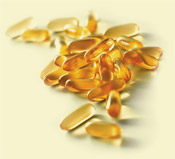Cooling Inflammation with Diet
by Elizabeth Walker, Ph.D.
This article was originally published in August 2005

Much of the imbalance in our bodies between pro- and anti-inflammatory messengers is due to an imbalance in our diets. There is an alternative. We can restore the balance of inflammation through making changes in our diets.
- Introduction
- A primer on fats
- Nutritional anti-inflammatories
- Anti-inflammatory supplements
- Putting it all together
- For more information
(August 2005) — Let’s start with a few words of appreciation. We need inflammation in order to stay alive. When we get a cut, a sprain or a sore throat, the heat, swelling, redness and even pain that we experience are signs that our immune systems are working to help us fight pathogens and repair tissue damage.
Our cells make pro-inflammatory messengers to call our immune systems to the site of damage. But then, when we are past the acute stage of healing, we need our cells to make anti-inflammatory messengers to signal the immune system to calm down. It’s this shutoff process that is not happening for many of us, leading to a state of excessive inflammation.
Much of the imbalance in our bodies between pro- and anti-inflammatory messengers is due to an imbalance in our diets. The messengers are made from fatty acids — the building blocks of fats — and the kinds of fats we eat help determine whether we make more pro- or anti-inflammatory messengers. As the American diet has changed over the past decades, many of us have tipped toward the pro-inflammatory state.
This pro-inflammatory state makes us more prone to a long list of chronic illnesses, including heart disease, arthritis, diabetes, some cancers, Alzheimer’s, hypertension, gum disease, depression, allergies, asthma, autoimmune illnesses, inflammatory bowel disease, eczema and a whole host of others. Some researchers see aging itself, including wrinkles and forgetfulness, as a condition of inflammation.
We can take anti-inflammatory medications to help rebalance the system. But all of these, from Vioxx to aspirin, have significant side effects.
There is an alternative. We can restore the balance of inflammation through making changes in our diets. All of the remedies I suggest below have proven effective in treating at least one inflammatory condition, and what treats one often will treat or prevent others.
Nutritional anti-inflammatories
- Limit farmed salmon, organ meats (such as liver) and egg yolks. These contain a fatty acid known as arachadonic acid, or AA, which our bodies can convert directly to pro-inflammatory messengers. Other meats have some AA, but at lower levels, with fatty portions having more than lean, poultry having more than beef or pork, and corn-fed animals having more than grass-fed ones. Dairy foods and most wild seafood have very little.But not all fish have the good healthy fats. Farmed salmon, as discussed above, contains unhealthy AA instead of healthy EPA, and some fish, such as cod, has little of either. Seafood with the highest levels of the good, healthy fats include anchovies, Atlantic mackerel, herring, wild salmon, roe, caviar, Alaskan king crab, smelt, shrimp and squid.
- Eat wild fish. These contain the healthy fatty acids EPA and DHA, which, in addition to supporting brain and skin health, make anti-inflammatory messengers. Eating fish several times a week is an excellent way to reduce inflammation.

- Eat less seed oil and trans-fatty acids. Oil from corn, safflower, sunflower, soy and cottonseed contains omega-6 fatty acids, which our bodies convert to pro-inflammatory messengers. Trans-fatty acids inhibit the production of anti-inflammatory messengers. These fats are found in margarines and vegetable shortenings, commercial baked goods such as crackers and cookies, and in many other processed foods. You can identify them on labels with the words “partially hydrogenated oil.” Be aware that many restaurants use these fats for frying. The best substitute for these fats is olive oil, which is mildly anti-inflammatory.
- Keep your insulin levels down. High insulin levels promote inflammation through increasing AA, the building block for pro-inflammatory messengers. A full discussion of reducing insulin levels is beyond the scope of this article, but the basics include exercising, reducing abdominal fat, eating small frequent meals, and eating fewer high-glycemic load carbs (especially bread, potatoes and sugars) at one time.
- Eat more vegetables, fruits, green tea and healthy herbs. Dark-colored fruits and vegetables, especially red, blue and black berries, cherries and grapes, are particularly healthy, as are onions, garlic, chives, ginger, turmeric, rosemary, basil and oregano. Green tea also is a proven anti-inflammatory. These foods contain antioxidants, which help dampen the inflammatory response, and/or Cox-2 inhibitors, which inhibit the creation of inflammatory messengers.
- Discover and avoid foods you may be allergic to. Food allergies put your immune system in high gear and are themselves a form of inflammation. Plants in the nightshade family, including tomatoes, potatoes, eggplant, and peppers, cause an arthritis reaction in some people. Wheat is often a cause of inflammation for people with autoimmune illnesses. (See “Are you sensitive to certain foods?”, Sound Consumer, May 2005.)
Anti-inflammatory supplements

- Fish oil. Because fish oil is so effective for both healthy brains and balanced inflammatory states, I recommend it for everybody, from fetuses to the elderly.
Cod liver oil is the cheapest form. It contains vitamin A and D at levels that are healthy for most of us but may be too high for pregnant women. Regular fish oil has no A and D. A new form called “ultra-refined” is more concentrated, so you have to swallow less.
Since fish oil is highly subject to turning rancid, choose a brand you respect — Carlson’s or Nordic Naturals or other brands by PCC — and store it in your refrigerator or freezer. Discard it if it starts to smell rancid.
Fish oil capsules are an option for those who have trouble swallowing the oil. A recent study concluded that almost every brand of capsules tested was low in mercury and PCBs. However, check labels to ensure the oil was tested for toxins by independent certifiers.
How much do you need? That depends on your health and how closely you follow the other guidelines here. In general, I suggest one gram of EPA plus DHA on any day you don’t get a serving of high EPA fish. That’s about one tablespoon of fish oil or several capsules. (Read labels for comparable amounts of DHA.) If you have a lot of inflammation, more might be even better. Check with your healthcare practitioner about blood tests for inflammation that can help you know if you need more fish oil or should follow other remedies listed in this article.
Fish oil will thin your blood. This is usually healthy, but if you are already on blood thinners or bruise easily, talk with your doctor.
Unfortunately for vegetarians, flax seeds and flax oil are not nearly as effective as fish and fish oil. Our bodies are too inefficient at processing them into the fatty acids we need.
- Borage oil or evening primrose oil. These contain a fatty acid called GLA (gamma linolenic acid), which our bodies convert into an enzyme that blocks inflammation. Take it with food, and use it only if you are also getting the amount of EPA fish or fish oil recommended, to ensure the right balance of fatty acids. A recent study showed 600 mg of GLA a day caused a significant reduction in joint pain in people with rheumatoid arthritis.
- Vitamin D. Vitamin D helps prevent and treat most of the ailments already mentioned because it is an anti-inflammatory. If we are outside in the summer, our skins can make enough, but in Seattle’s dark winter season, we may need 1000 to 4000 IU a day.
Putting it all together

Taking fish oil is probably the easiest and most effective way to start controlling inflammation. Then choose options from the above that make the most sense for your own health issues. Since each option promotes health in various ways, you’ll feel better as you try more of them. You won’t need to do all of them every day, just enough to balance your own system.
For instance, Catherine, a 60-year old woman with diabetes, worked hard to get more exercise, replace high-glycemic load carbohydrates with healthy fruits and vegetables, and to eat fish or take fish oil every day. Not only did her blood sugar and insulin levels improve, but her blood pressure came down and her knees and hips became much less painful. She is now cutting back on high-AA foods to see if she can get even better results.
Tim, a teenager with juvenile rheumatoid arthritis, did not want to make changes in his diet. But when he began to take supplements of fish oil, vitamin D, and borage oil, he experienced fewer flares and less pain in his joints.
And Tracy, a woman in her fifties with plantar fascitis, found that when she cut back on grain-fed meats, eggs, wheat, sugar and foods from the nightshade family, she no longer needed to take anti-inflammatory medications for her foot pain. She was surprised to find that as a “side effect” her hot flashes became less frequent and her rosacea cleared up.
If you have inflammation symptoms, following these guidelines should help you start to feel better within a few weeks — not as fast as taking an anti-inflammatory drug, but with fewer negative effects and a lot more pleasure in the eating of good foods.
For more information
- Chilton, Floyd, Ph.D. (2005.) Inflammation Nation. New York: Simon & Schuster
- Sears, Barry, Ph.D. (2005.) The Anti-Inflammation Zone. New York: Harper Collins
- www.oceansalive.org (for information on fish safety)
- www.ConsumerLab.com (for ratings of nutritional supplements, including fish oil)
Elizabeth Walker, M.S., Ph.D., is a counselor in private practice in Seattle. She provides her clients with holistic alternatives to Prozac and Ritalin, including neurofeedback, psychotherapy, energy psychology and nutrition education. To subscribe to her free email newsletter on mindbody health, contact her at 206-725-6926 or ecwalker@speakeasy.net
